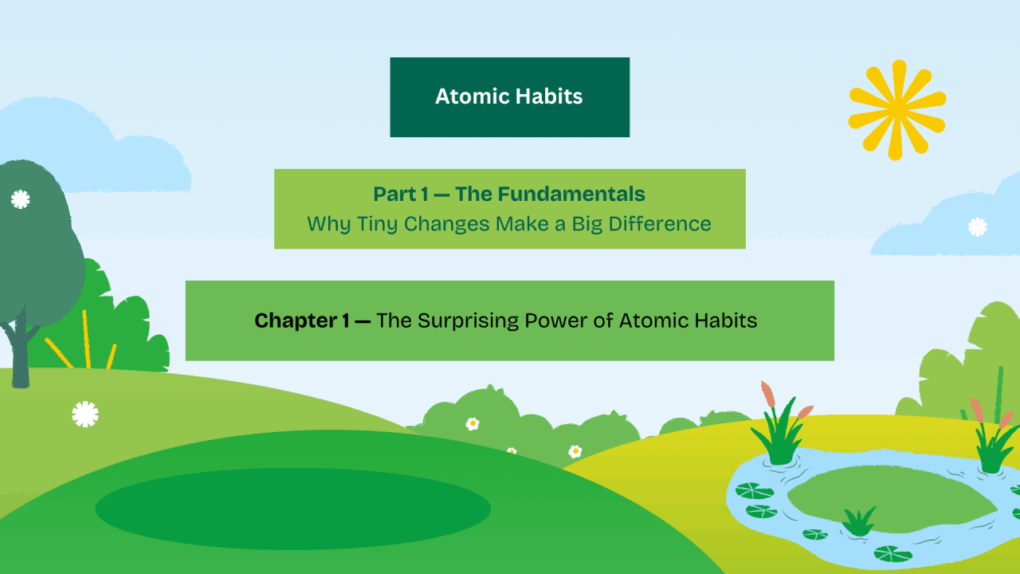July 29, 2025
Atomic Habits – Chapter 1: The Surprising Power of Atomic Habits

Book Highlights — Some books stick with you, others challenge you, and a few do both. I’m using this space to capture highlights, ideas, and reflections—less a summary, more a mix of what stood out and why it matters (at least to me). Maybe it sparks something for you too.
This time: Atomic Habits by James Clear — a practical guide to how small changes lead to big results.
💡 Key Concepts
The Four Laws of Behavior Change
These laws form the core framework of habit formation:
- Cue – The trigger for your behavior.
- Craving – The desire or motivation behind the behavior.
- Response – The actual habit or action.
- Reward – The outcome that reinforces the behavior.
🔬 The Power of Tiny Gains
“If you get 1% better each day for a year, you’ll end up 37 times better by the end.”
- Improvement is not always obvious in the short term but can be exponentially powerful over time.
- Focus on 1% marginal gains at every step of a process. These improvements may seem small, but they compound.
🌱 The Bamboo Analogy
Like bamboo:
- It spends the first 5 years building an underground root system, barely visible.
- Then, it grows 30 meters in 6 weeks.
Progress is often invisible before it becomes explosive.
🧊 The Plateau of Latent Potential
- Progress feels slow because results are delayed.
- This delay leads to what the book calls a “valley of disappointment”—where you might feel like your effort isn’t paying off.
- But the work isn’t wasted. It’s being stored, building up for a breakthrough.
🧭 Goals vs Systems
“You do not rise to the level of your goals. You fall to the level of your systems.”
- Goals define where you want to go.
- Systems define how you get there—and whether you stay there.
Why Focusing Solely on Goals Can Be Misleading:
- Winners and losers often have the same goals. → It’s not goals that set them apart, it’s their systems.
- Goals produce temporary results. → You might hit a goal and then backslide.
- Goals can limit happiness. → You might tie your satisfaction to achieving something in the future, instead of enjoying the process now.
- Goals can clash with long-term progress. → Once you hit them, the motivation often fades.
Systems thinking is about falling in love with the process, not the outcome. That mindset creates sustainable success.
🧱 Habits Are the Atoms of Behavior
- Habits are small but mighty units of your life.
- While they might seem insignificant at first, they stack and multiply to shape your identity and outcomes over time.
- Each small habit is a vote for the person you are becoming.
🛠 If You’re Struggling to Change…
“The problem isn’t you—it’s your system.”
- Bad habits persist not because you lack willpower, but because you have systems that reinforce them.
- To change habits for good, don’t fix outcomes—fix the inputs.
🔄 Final Thought
“True long-term thinking is goal-less thinking.”
Progress comes not from chasing a finish line but from continuous improvement and commitment to the process.
✍️ How to Use This
- Re-read this before setting any goals. Ask: Do I have a system in place to support this?
- Track 1% daily improvements instead of milestones.
- Celebrate small wins. They’re building something much bigger.
- When motivation fades, return to your system, not your ambition.
🧭 Reflection Prompt
What’s one area of your life where you’re too focused on outcomes and not enough on the system?
Comments(5)
Comments are closed.

Trackback: Atomic Habits – Chapter 2: How Your Habits Shape Your Identity (and Vice Versa) | Abdelrahman Omran
Trackback: Atomic Habits – Chapter 3: How to Build Better Habits in 4 Simple Steps | Abdelrahman Omran
Trackback: Atomic Habits – Chapter 4: The Man Who Didn’t Look Right | Abdelrahman Omran
Trackback: Atomic Habits – Chapter 5: The Best Way to Start a New Habit | Abdelrahman Omran
Trackback: Atomic Habits – Chapter 6: Motivation Is Overrated; Environment Often Matters More | Abdelrahman Omran